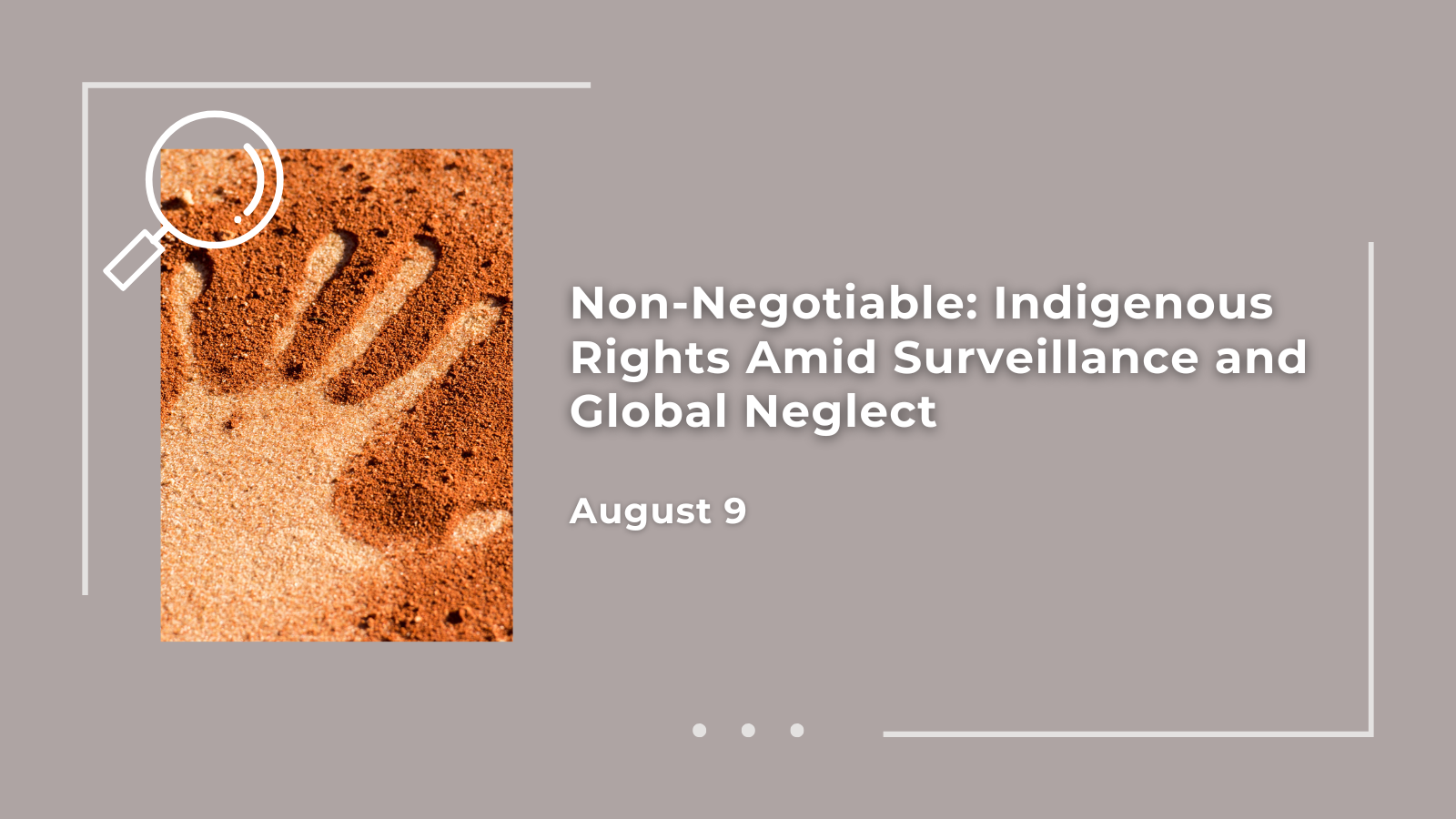
Non-Negotiable: Indigenous Rights Amid Surveillance and Global Neglect
Every August 9th marks the International Day of the World’s Indigenous Peoples, a date proclaimed by the United Nations to recognize the history, culture, spirituality, and struggles of Indigenous communities. In 2025, this day arrives with a stark warning: emerging technologies, such as artificial intelligence, far from being tools for inclusion, are being used to surveil and harass Indigenous leaders.
This was denounced by Volker Türk, UN High Commissioner for Human Rights, during the opening of the 18th session of the Expert Mechanism on the Rights of Indigenous Peoples (July 2025). According to Türk, “States are using AI-based surveillance tools to track and harass defenders of the rights of Indigenous peoples.” He added that without clear human rights safeguards, artificial intelligence could deepen the structural inequalities already affecting Indigenous peoples.
This is not a theoretical concern. According to data gathered by the Office of the High Commissioner, between 2023 and 2024, 26% of human rights defenders killed worldwide were Indigenous — most of them in the Americas. These deaths often occur in contexts of impunity and in the midst of struggles to defend land, against megaprojects, extractive industries, or agricultural expansion. Türk also emphasized that many Indigenous peoples still lack legal recognition of their territories, leaving them even more vulnerable.
The threats do not end there. Deforestation, mining, and large-scale agribusiness continue to encroach on Indigenous lands without their free, prior, and informed consent. At the same time, climate change worsens the situation: fires, droughts, and floods are destroying the ecosystems that have sustained these communities for millennia. “Indigenous peoples are among the most exposed and vulnerable to climate chaos,” Türk concluded.
In his 2024 message, UN Secretary-General António Guterres emphasized that Indigenous peoples represent about 6% of the world’s population but protect around 80% of the planet’s biodiversity. He warned that, despite their role as environmental guardians, they continue to be victims of violence, land dispossession, and violations of the rights enshrined in the United Nations Declaration on the Rights of Indigenous Peoples. The 2024 message emphasized the right of Indigenous peoples to protect themselves from unwanted contact, particularly those in voluntary isolation.
From April 24 to May 2, 2025, the 24th Session of the United Nations Permanent Forum on Indigenous Issues was held in New York, bringing together nearly 1,000 participants: Indigenous leaders, governments, and UN bodies. The central theme was the implementation of the Declaration, evaluating best practices and challenges in its application at different levels. While some progress has been made, the diagnosis was clear: collective rights remain sidelined, particularly in relation to land, natural resources, and effective political participation.
In parallel, on April 25, 2025, the United Nations released a report revealing a concerning imbalance: although Indigenous peoples represent only 6% of the global population, they protect 80% of global biodiversity, yet receive less than 1% of international climate funding. Often, the so-called “green solutions” promoted by governments and corporations — such as wind farms, dams, or carbon credit projects — are implemented without their consent, leading to displacement and conflict. The report insists that Indigenous knowledge should be recognized not as “traditional knowledge,” but as fully valid scientific and technological systems.
Another critical issue addressed in a 2025 report by the Department of Economic and Social Affairs (DESA) is the gap between the 2030 Agenda and the Sustainable Development Goals concerning Indigenous rights. While the global goals speak of equality and sustainability, they often omit fundamental rights such as control over ancestral lands or self-governance. Without genuine inclusion of these demands, DESA affirms, neither poverty eradication nor climate justice will be achieved.
In this context, the upcoming COP30 Climate Summit, to be held in Belém (Brazil), in the heart of the Amazon, has generated both hope and concern. Indigenous organizations fear exclusion from the debate due to high participation costs and a lack of guarantees for intercultural dialogue. Analysts, such as researcher Marcos Colón, warn of the risk of turning the summit into a “climate carnival” lacking Indigenous protagonism, despite being held on ancestral territory.
This International Day must be more than a commemorative occasion. It is an invitation to listen to and respect Indigenous voices as essential components of any global solution. Their knowledge, their struggles, and their proposals are key to rethinking a just and sustainable future. Protecting their rights is not an act of charity — it is an urgent necessity for the planet we all share.
Carmen Coleto Martínez, Junior Project Manager



